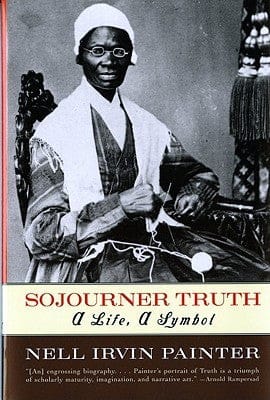
Sojourner Truth: A Life, A Symbol by Nell Irvin Painter
-
Sojourner Truth first gained prominence at an 1851 Akron, Ohio, women's rights conference, saying, "Dat man over dar say dat woman needs to be helped into carriages, and lifted over ditches. . . . Nobody eber helps me into carriages, or ober mud-puddles . . . and ar'n't I a woman?"
Sojourner Truth: ex-slave and fiery abolitionist, figure of imposing physique, riveting preacher and spellbinding singer who dazzled listeners with her wit and originality. Straight-talking and unsentimental, Truth became a national symbol for strong black women--indeed, for all strong women. Like Harriet Tubman and Frederick Douglass, she is regarded as a radical of immense and enduring influence; yet, unlike them, what is remembered of her consists more of myth than of personality.
Now, in a masterful blend of scholarship and sympathetic understanding, eminent black historian Nell Irvin Painter goes beyond the myths, words, and photographs to uncover the life of a complex woman who was born into slavery and died a legend. Inspired by religion, Truth transformed herself from a domestic servant named Isabella into an itinerant pentecostal preacher; her words of empowerment have inspired black women and poor people the world over to this day. As an abolitionist and a feminist, Truth defied the notion that slaves were male and women were white, expounding a fact that still bears repeating: among blacks there are women; among women, there are blacks.
No one who heard her speak ever forgot Sojourner Truth, the power and pathos of her voice, and the intelligence of her message. No one who reads Painter's groundbreaking biography will forget this landmark figure and the story of her courageous life. Photographs -
Sojourner Truth: A Life, A Symbol
By Nell Irvin Painter
Paperback: 384 pages
-
Because other biographies of Sojourner Truth, unusual even among ex-slave women as itinerant preacher and political activist, have been published in recent years, Painter's compelling life loses some of its edge. Yet it has additional strengths as 19th-century social history. Isabella Van Wagenen, a Pentecostalist domestic born into slavery about 1797 but who reinvented herself at 59 as an abolitionist orator, then into a fiery suffragist, is seen here through the prism of the religious, social and political movements that animated her. A striking presence on the platform, the subject of an as-told-to autobiography that went through many editions and helped sustain her financially, she seemed a born survivor, shedding slavery, abuse, poverty and prejudice during her 80-odd years (admirers claimed 110?she died in 1883). Shrewd, and with a commonsense wit, possessed of such a thundering voice that skeptics wondered if she were a man, she was never, Painter asserts, a quaintly exotic innocent. Relying on biblical allusions that her "Bible-literate" audiences could amplify, she was spellbinding. Still, Painter reminds us, "Everything we know of Sojourner Truth comes through other people, mostly educated white women," for, despite decades of involvement with liberal, even radical, intellectuals, she remained illiterate. Cutting through the image-making of her contemporaries as well as later interpreters who envision Sojourner Truth as the symbol of the strong woman, "black or not," Painter persuasively offers us the real woman behind the myth.
—Publisher's Weekly
